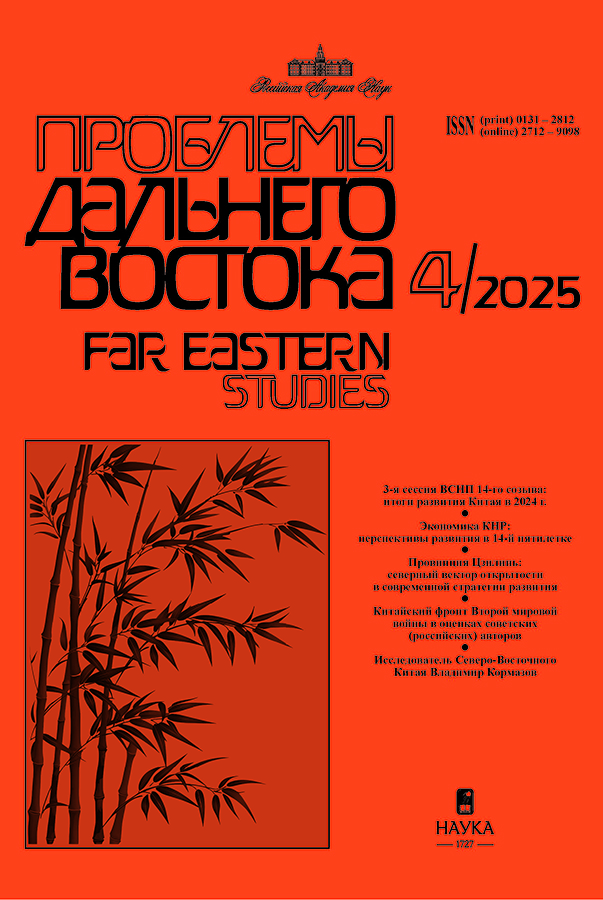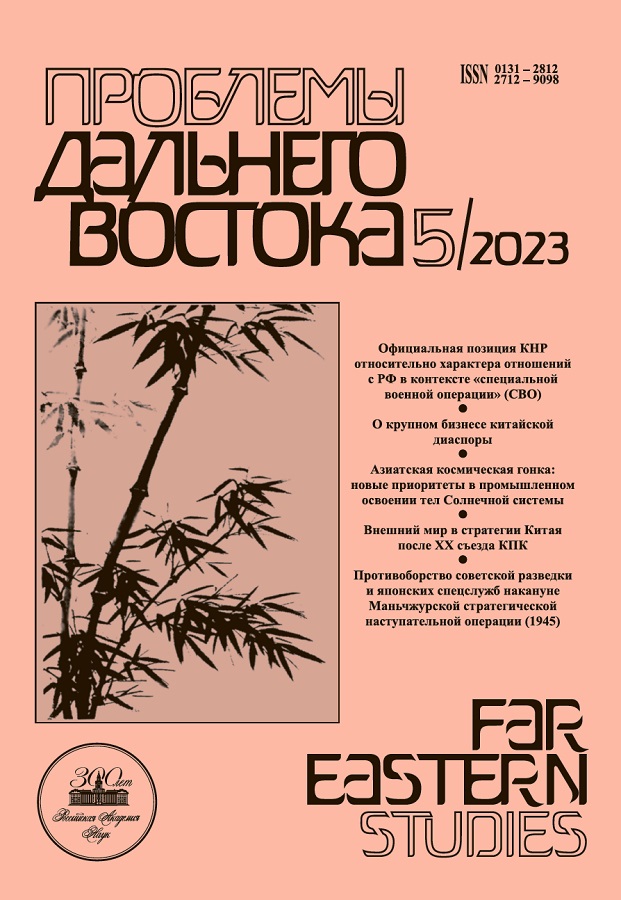Universal Basic Income in the Republic of Korea: Development of Social Security or Populism?
- Authors: Valitova D.V.1, Kukla M.P.1
-
Affiliations:
- Far Eastern Federal University
- Issue: No 5 (2023)
- Pages: 78-89
- Section: Articles
- URL: https://rjmseer.com/0131-2812/article/view/675295
- DOI: https://doi.org/10.31857/S013128120027823-6
- ID: 675295
Cite item
Abstract
Since the 2010s the Republic of Korea is experiencing a wide range of socio-demographic problems — the aging of the population, low birth rate, the destruction of the traditional family structure, inequality, poverty of the elderly, youth unemployment. Every year these problems exacerbate each other, inflaming the discussion in politics and society about the need to develop the social security system. According to OECD standards, social welfare spending in the Republic of Korea remains low, and social policy itself is recognized as ineffective, examples of which are increasing income polarization, poverty and extreme poverty that drives many people to suicide. Social policy cannot solve the primary problem of Korean society — the declining birth rate. The discussion about the development of the social state in ROK, among other things, focuses on the possibilities of the universal basic income — a system that involves unconditional unified payments to every resident of the country. Left-wing parties are increasingly resorting to the topic of the universal basic income in their election programs. The article talks about experiments on the implementation of the universal basic income in the Republic of Korea, analyzes the programs of presidential candidates in 2022. The experiments and election slogans of left-wing politicians are designed primarily to support young people and increase their electoral activity. In addition to the usual conclusion about the immaturity of the social system of ROK by European standards, it is important to understand that awareness of the possibilities of the UBI among the population is also insufficient to play a significant role in the outcome of the elections.
About the authors
Daria Valer'evna Valitova
Far Eastern Federal University
ORCID iD: 0009-0004-8454-1433
10, Ajax, Russky Isl., Vladivostok, 690922, Russian Federation
Marina Petrovna Kukla
Far Eastern Federal UniversityRussian Federation, Vladivostok
References
- Gender wage gap // OECD Data. URL: https://data.oecd.org/earnwage/gender-wage-gap.htm (дата обращения: 23.05.2023).
- Gentilini U., Grosh M., Rigolini, J., Yemtsov R. Exploring Universal Basic Income: A Guide to Navigating Concepts, Evidence, and Practices. Washington, DC: World Bank. 2020. 337 p.
- Gourevitch A. The Limits of a Basic Income: Means and Ends of Workplace Democracy // Basic Income Studies. 2016. Vol. 11. No. 1. P. 15–34. doi: 10.1515/bis-2016–0008
- Kim J., Jong W., Shin K. Gender Inequality and Economic Growth in Korea // Pacific Economic Review. 2016. Vol. 23. No. 4. Pp. 658–682. doi: 10.1111/1468–0106.12181
- Social Expenditure — Aggregated data // OECD Statistics. URL: https://stats.oecd.org/Index.aspx?datasetcode=SOCX_AGG (дата обращения: 18.05.2023).
- Standing G. Basic Income: And How We Can Make It Happen. Pelican. 2017. 320 p.
- Suicide rates // OECD Data. URL: https://data.oecd.org/healthstat/suicide-rates.htm (дата обращения: 05.05.2023).
- Van Parijs P., Vanderborght Y. Basic Income: A Radical Proposal for a Free Society and a Sane Economy. Harvard University Press. 2017. 400 p.
- 김찬휘. 경기도의 기본소득 실험 (Ким Чханхви. Эксперимент с базовым доходом в провинции Кёнги) // 정치경제연구소 «대안». 2020. 권 77. 27–41 쪽.
- 남재욱. 한국 복지국가 성장의 재분배적 함의: 누가 복지국가로부터 소외됐는가? (Нам Джэук. Последствия роста государства всеобщего благосостояния в Республике Корее: кто остался за бортом государства всеобщего благосостояния?) // 한국사회정책. 2018. 권25 (4). 3–38쪽.
- 새 정부에서 수행할 우선 정책과제 (Приоритетные задачи политики для нового правительства) // KDI 국민 여론조사 개요. 2022. URL: https://www.kdi.re.kr/share/conferPtView?sd_no=2128&pp=&year=&month=&sm_no=531 (дата обращения: 29.05.2023).
- 소득5분위별 가구주 종사상지위별 자산, 부채, 소득 현황 2020–2022 (Оценка доходов, долга и собственности по пяти квантилям доходов и по статусу занятости главы домохозяйства) // Korean Statistical Information Service. URL: https://kosis.kr/statHtml/statHtml.do?orgId=101&tblId=DT_1HDAA13&conn_path=I2 (дата обращения: 09.09.2023).
- 손애성. 성남시 청년배당정책은 어떻게 만들어졌나: 당파성 이론을 중심으로 (Сон Эсон. Как создавалась политика выплаты дивиденда молодежи города Соннам: в центре внимания теория партийности) // 아세아연구. 2017. 권 60 (1). 52–100 쪽.
- 연령별 경제활동인구 총괄 (Общая численность экономически активного населения по возрасту) // Korean Statistical Information Service. URL: https://kosis.kr/statHtml/statHtml.do?orgId=101&tblId=DT_1DA7002S&conn_path=I2 (дата обращения: 29.05.2023).
- 유영성. 경기도 청년기본소득 정책효과 분석: 사전 및 사후조사 비교 (Ю Ёнсон. Анализ политики базового дохода для молодежи провинции Кёнгидо: сравнение опросов до и после) // 경기연구원. 연구보고서. 2019. URL: https://youth.gg.go.kr/gg/intro/archives.do?mode=download&articleNo=1953&attachNo=1959 (дата обращения: 01.06.2023).
- 윤혜린, 오민홍. 성남시 청년배당의 노동시장 성과에 관한 연구 (Юн Херин, О Минхон. Исследование влияния дивиденда молодежи города Соннам на рынок труда) // Journal of Economic Studies. 2021. 권 39 (1). 31–65 쪽.
- 이사장, 김유선. 성남시 청년배당 효과분석 (Ли Саджан, Ким Юсон. Анализ дивиденда для молодежи города Соннам) // 한국노동사회연구소. 2019. 148쪽.
- 정종원, 신현기, 이선영. 기본소득의 정책피드백 효과 분석 — ‘부분 기본소득’으로서 경기도 청년기본소득을 대상으로 (Чон Джонвон, Син Хёнги, Ли Сонён. Анализ влияния базового дохода на политику — О базовом доходе для молодежи провинции Кёнгидо как «частичном базовом доходе») // 한국정책학회. 2020. 권29 (4). 55–86 쪽.
- 정한울, 김수진. 한국사회의 기본소득에 대한 여론 동향과 변화:경기도 «기본소득 공론화 조사» 및 한국리서치 “여론 속의 여론결과를 중심으로» (Чон Хануль, Ким Суджин. Тенденции и изменения в общественном мнении о базовом доходе в корейском обществе: на основе результатов «Обзора общественного мнения по базовому доходу» в провинции Кёнгидо и опросов общественного мнения Hankook Research) // 한국기본소득 네트워크 «2019년 한국기본소득포럼» 발표. 2019. URL: https://basicincomekorea.org/wp-content/uploads/2019/11/Sess-4_PT0-special_정한울-김수진_UBI-Forum-2019_final.pdf (дата обращения: 30.05.2023).
- 주요 연령계층별 추계인구 (생산연령인구, 고령인구 등) (Оценка населения по основным параметрам (трудоспособное население, пожилое население и т.д.)) // Korean Statistical Information Service. URL: https://kosis.kr/statHtml/statHtml.do?orgId=101&tblId=DT_1BPA003&conn_path=I2 (дата обращения: 29.05.2023).
- 합계출산율, 모의 연령별 출산율 (Общий коэффициент рождаемости, коэффициент рождаемости по возрасту матери) // Korean Statistical Information Service. URL: https://kosis.kr/statHtml/statHtml.do?orgId=101&tblId=DT_1B81A17&vw_cd=MT_ZTITLE&list_id=A21&seqNo=&lang_mode=ko&language=kor&obj_var_id=&itm_id=&conn_path=MT_ZTITLE (дата обращения: 05.05.2023).
Supplementary files











